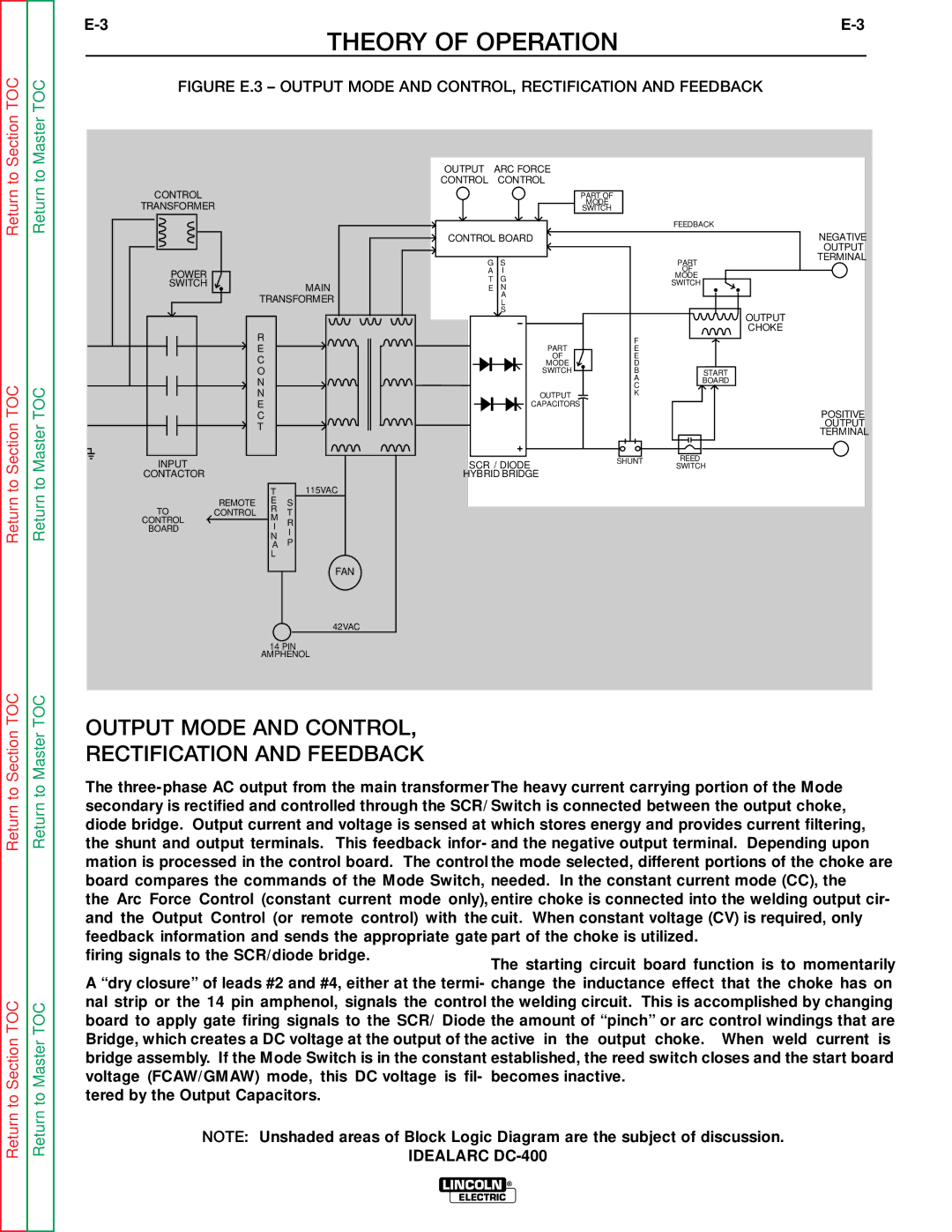
Section TOC
Master TOC
THEORY OF OPERATION
FIGURE E.3 – OUTPUT MODE AND CONTROL, RECTIFICATION AND FEEDBACK
Return to
Return to Section TOC
Return to
Return to Master TOC
CONTROL
TRANSFORMER
POWER |
|
|
|
SWITCH |
|
| MAIN |
|
|
| |
|
| TRANSFORMER | |
|
| R |
|
|
| E |
|
|
| C |
|
|
| O |
|
|
| N |
|
|
| N |
|
|
| E |
|
|
| C |
|
|
| T |
|
INPUT |
|
|
|
CONTACTOR |
|
|
|
|
| T | 115VAC |
| REMOTE | E | S |
TO | CONTROL | R | T |
CONTROL |
| M | R |
BOARD |
| I | I |
|
| N | |
|
| P | |
|
| A | |
|
| L |
|
|
|
| FAN |
|
|
| 42VAC |
|
| 14 PIN | |
|
| AMPHENOL | |
OUTPUT | ARC FORCE |
|
|
|
CONTROL | CONTROL |
|
|
|
| PART OF |
|
|
|
| MODE |
|
|
|
| SWITCH |
|
|
|
|
|
| FEEDBACK |
|
CONTROL BOARD |
|
| NEGATIVE | |
|
|
|
| OUTPUT |
G | S |
| PART | TERMINAL |
A | I |
| OF |
|
T | G |
| MODE |
|
| SWITCH |
| ||
E | N |
|
| |
|
|
| ||
| A |
|
|
|
| L |
|
|
|
| S |
|
| OUTPUT |
|
|
|
| |
|
|
|
| CHOKE |
|
| F |
|
|
| PART | E |
|
|
| OF | E |
|
|
| MODE | D |
|
|
| SWITCH | B | START |
|
|
| A | BOARD |
|
|
| C |
| |
|
|
|
| |
| OUTPUT | K |
|
|
|
|
|
| |
| CAPACITORS |
|
|
|
|
|
|
| POSITIVE |
|
|
|
| OUTPUT |
|
|
|
| TERMINAL |
SCR / DIODE | SHUNT | REED |
| |
SWITCH |
| |||
|
| |||
HYBRID BRIDGE |
|
|
| |
Return to Section TOC
to Section TOC
Return to Master TOC
to Master TOC
OUTPUT MODE AND CONTROL, RECTIFICATION AND FEEDBACK
The
A “dry closure” of leads #2 and #4, either at the termi- nal strip or the 14 pin amphenol, signals the control board to apply gate firing signals to the SCR/ Diode Bridge, which creates a DC voltage at the output of the bridge assembly. If the Mode Switch is in the constant voltage (FCAW/GMAW) mode, this DC voltage is fil- tered by the Output Capacitors.
The heavy current carrying portion of the Mode Switch is connected between the output choke, which stores energy and provides current filtering, and the negative output terminal. Depending upon the mode selected, different portions of the choke are needed. In the constant current mode (CC), the entire choke is connected into the welding output cir- cuit. When constant voltage (CV) is required, only part of the choke is utilized.
The starting circuit board function is to momentarily change the inductance effect that the choke has on the welding circuit. This is accomplished by changing the amount of “pinch” or arc control windings that are active in the output choke. When weld current is established, the reed switch closes and the start board becomes inactive.
Return
Return
NOTE: Unshaded areas of Block Logic Diagram are the subject of discussion.
IDEALARC
LINCOLN ®
ELECTRIC
